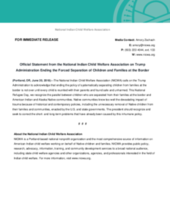This page contains documents and other resources related to children's care in the Americas. Browse resources by region, country, or category.
Displaying 1811 - 1820 of 3191
This joint publication from Child Trends and the National Research Center on Hispanic Children and Families calls attention to the critical need to support immigrant families in the US who have been negatively affected by the trauma of separation, and who will likely continue to experience considerable adversity in the future, even if reunited with their loved ones.
In a recent statement, Destination Unknown, a network of over 100 organisations worldwide, coordinated by Terre des Hommes, has expressed its concern regarding the family separations currently imposed at the US border with Mexico "and the traumatic and detrimental effect it is having on children."
According to this opinion piece from the Guardian - written by Matthew L Kolken, an immigration lawyer and an elected member of the Board of Governors of the American Immigration Lawyers Association - the US federal government has contracted the defense industry to provide childcare to children who have been separated from their parents as they've crossed over the border into the US from Mexico.
In this study, the authors used a two-year Texas foster care entry cohort to examine the extent to which children experience “progress moves”, such as moving to a sibling placement or to live with a relative, versus non-progress moves, such as moving due to risk of abuse.
This study examines how a child welfare agency implemented an innovative pilot initiative designed to promote timely family reunification.
This article from Quartz takes a historical view of orphanages in the United States, reporting that orphanages often separated children of color at disproportionately high rates as compared to white children and that most of the children housed in orphanages during the time of their use in the US had at least one living parent.
The National Indian Child Welfare Association (NICWA) calls on the Trump Administration to acknowledge that ending the policy of systematically separating children from families at the border is not over until every child is reunited with their parents and found safe and unharmed.
This "Statement of the Evidence" from the Society for Research in Child Development presents the evidence on the harmful impacts of family separation.
This article from NBC News shares perspectives of several child development researchers and other experts, including Nathan Fox (a child development specialist at the University of Maryland and one of the primary researchers in the Bucharest Early Intervention Project), regarding the impacts of family separation on children.
Harvard University's Center on the Developing Child has issued a statement calling the US policy of "sudden, forcible separation of children from their parents" a "deeply traumatic" experience for both children and parents.



